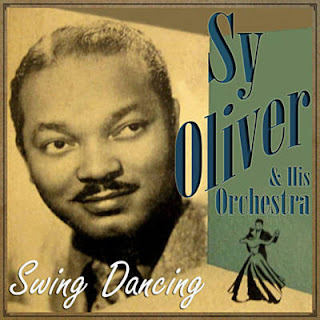Melvin James "Sy" Oliver (December 17, 1910 – May 28, 1988) was one of America's great jazz composers and arrangers, trumpeter, singer and bandleader who had a significant impact on American popular music,
Sy Oliver was born in Battle Creek, Michigan. His mother was a piano teacher and his father was a multi-instrumentalist who made a name for himself demonstrating saxophones at a time that instrument was little used outside of marching bands.
 |
Sy Oliver, Edwin Wilcox & Willie Smith |
As a trumpeter in high school, Oliver played with Cliff Barnett's Club Royal Serenaders. and at age 17, he moved up to the more prestigious territory bands, working with Zack Whyte and his Chocolate Beau Brummels - and beginning to gain renown as an arranger - and with Alphonso Trent's band, which was based in Cincinnati. He became known for his "growling" horn playing.
 Oliver's arrangements were at the core of the band's repertory. Such Oliver compositions as ''For Dancers Only,''''Dream of You,''''Organ Grinder Swing,''''Stomp It Off'' and '''Tain't What You Do'' helped define the orchestra, and they remain some of jazz's finest arrangements and compositions. He also arranged novelty or nostalgia tunes for the orchestra, slyly remaking them into major pieces. And the use of a vocal trio, brilliantly arranged by Oliver, became one of the orchestra's trademarks. New Allegiance
Oliver's arrangements were at the core of the band's repertory. Such Oliver compositions as ''For Dancers Only,''''Dream of You,''''Organ Grinder Swing,''''Stomp It Off'' and '''Tain't What You Do'' helped define the orchestra, and they remain some of jazz's finest arrangements and compositions. He also arranged novelty or nostalgia tunes for the orchestra, slyly remaking them into major pieces. And the use of a vocal trio, brilliantly arranged by Oliver, became one of the orchestra's trademarks. New AllegianceMr. Oliver was hired away from the Lunceford Orchestra in 1939 by the Tommy Dorsey Orchestra, for which he arranged and sang and for which he also composed a number of songs, including ''Opus One'' and ''Easy Does It.'' Mr. Oliver led a band in the Army between 1943 and 1945, and was host of a radio show, ''Endorsed by Dorsey,'' which featured his own band. He returned to Dorsey after the war.
 |
| Oliver & Duke Ellington |
He led the transition of the Dorsey band from Dixieland to modern big band. His joining was instrumental in Buddy Rich's decision to join Dorsey. His arrangement of "On the Sunny Side of the Street" was a big hit for Dorsey, as were his own compositions "Yes, Indeed!""Opus One""The Minor Is Muggin'", and "Well, Git It".
From the late 1940's to the early 70's, Oliver moved from job to job, working for 10 years at Decca Records as a musical director. He arranged and conducted many songs for Ella Fitzgerald. As a composer, one of his most famous songs was "T'ain't What You Do (It's the Way That You Do It)", which he co-wrote with Trummy
Young. One of his more successful efforts as an arranger was the Frank Sinatra album I Remember Tommy, a combined tribute to their former boss.He recorded several albums, including a tribute to the Lunceford band, and wrote scores for several television shows. He continued to compose, arrange and, occasionally, to perform.
Young. One of his more successful efforts as an arranger was the Frank Sinatra album I Remember Tommy, a combined tribute to their former boss.He recorded several albums, including a tribute to the Lunceford band, and wrote scores for several television shows. He continued to compose, arrange and, occasionally, to perform.
In the early 1970's, he formed a well-received nine-piece orchestra - featuring the clarinetist Barney Bigard, the pianist Cliff Smalls and the tenor saxophonist Arnett Cobb - that played the St. Regis-Sheraton, the Rainbow Grill and other clubs. In 1974, he and the group moved into the Rainbow Room, where they stayed until
1984, with occasional breaks for performances at jazz festivals and at Roseland in New York. He was also one of four musical directors of the New York Jazz Repertory Orchestra, which was dedicated to keeping jazz masterworks alive in a repertory setting. In 1984, Oliver retired to spend time with his family.
1984, with occasional breaks for performances at jazz festivals and at Roseland in New York. He was also one of four musical directors of the New York Jazz Repertory Orchestra, which was dedicated to keeping jazz masterworks alive in a repertory setting. In 1984, Oliver retired to spend time with his family.
Sy Oliver died of cardiovascular complications at Mount Sinai Hospital, New York City, May 28, 1988. He was 77 years old and had been suffering from cancer for a year.
(Edited from Wikipedia and mainly from NewYork Times)





